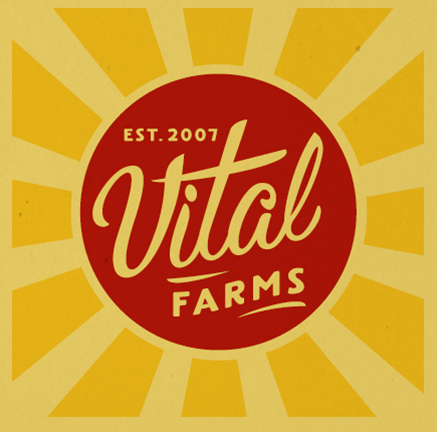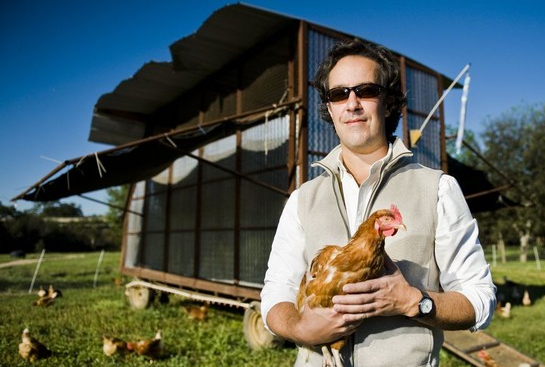Vital Farms: Pasture Raised Eggs in Austin
May 27, 2013
By: Kate White

Farm fresh eggs. What does that mean? Technically all eggs come from some sort of ‘farm’ that raises chickens but these farms can differ drastically. At one end of the spectrum are the ‘factory farms’ where chickens are crowded into incredibly tight spaces with no room to move and are only fed grain. These chickens spend their whole lives in these conditions. At the other end of this spectrum are the farms where the chickens are allowed to roam freely and feed on grasses and insects. Those of us in Austin are lucky to have a farm of the latter type right here in our city.
Vital Farms, which settled in Austin in 2007, is located on Brandt Road, off Slaughter Lane just east of I-35. The farm sits on 27 acres of organically farmed land and is the flagship farm for the company. They have smaller farms in Arkansas and Oklahoma where some broilers are also raised. The farm in Austin raises chickens solely for the purpose of egg laying and there are currently around a thousand egg layers on the property with another two thousand ‘babies’ being raised. This is a relatively small flock and insures that the farmers are able to get to know their chickens and care for them appropriately. The farm is managed by Bob Langner who was raised on a dairy farm in South Dakota and actually has a degree in English. Bob is assisted by one farm hand so this is truly a small, hands-on operation.

The chickens are allowed to roam 24/7 on land that has never seen pesticides or herbicides. The birds are kept in large, rope-fenced corrals that are moved on a weekly basis since the chickens will literally pick the ground bare. This area is then allowed to regenerate over a two month recovery period. The chickens at Vital Farms are allowed more space to roam than any other egg farm in the country. At night, most of the chickens do retreat to roosts that are referred to as Mobile Chicken Units. These units are actually re-purposed cotton wagons and are moved around the property on a regular basis. Because egg laying decreases with shorter days, the farm utilizes artificial lighting to extend daylight and make all days a uniform length. The farm is surrounded by an electric fence to reduce incursions and attacks by predators.
The baby chickens, which arrive by mail order from companies in the Midwest, are referred to as poults until 20 weeks when they actually begin laying eggs. They are at their prime when they first begin laying and their production begins to decline around 70 weeks. However, many of the chickens at Vital Farms continue to be productive at 80 weeks and beyond. This is due to the availability of fresh native grasses which are rich in beta-carotene and vitamins A, D and E. The clover that grows on the land increases nitrogen in the soil and chicken droppings are high in phosphorous, all adding to a rich, organic environment for the chickens. In addition to grazing, the chickens also have the opportunity to feed on organic, corn-based grain from a company in Elgin. Adult chickens can eat about one fourth of a pound of feed per day. They are also fed oyster shells which increases the strength of the shell (these eggs are hard to crack!).
Vital Farms eggs are certified organic by the USDA. The farm is also Certified Humane® and is inspected regularly by Whole Foods who is the largest purchaser of the eggs. The chickens on the Austin farm lay approximately 650 eggs per day and when they have ceased to produce, they are sold to area farmers but not for the purpose of being slaughtered.
Here are some interesting chicken and egg facts:
- The egg pigment (brown, blue etc) is drawn from the legs of the chicken which are pale during their egg laying period. A chicken with bright yellow legs is past its prime.
- The color of the yolk comes from the grass, if the chickens are indeed eating grass. The better the grass, the more orange and tasty the yolk is.
- The protein in the egg is a result of the insects the chickens eat while roaming and grazing.
- Broody breeds will sit on anything to try to hatch. Sometimes the eggs have to be replaced with golf balls in order to harvest.
- Jumbo eggs, which often have two yolks, are not encouraged since laying them is extremely hard on the chicken.
- The ear lobe on the chicken indicates the egg color.
- Eggs without a rooster to fertilize them will not hatch.
The farm does offer tours to the public in the spring and fall. You can check their website for more information. In addition to purchasing Vital Farms eggs at Whole Foods, you can find their booth at the Barton Creek Farmers Market on Saturday mornings. Ruth will be happy to sell you a dozen, or more, of the best eggs in Austin. Why would you want to eat anything else?
Source: http://www.examiner.com/article/vital-farms-pasture-raised-eggs-austin

Examiner.com
Posted: May 31, 2013 by Certified Humane
Vital Farms: Pasture Raised Eggs in Austin
May 27, 2013
By: Kate White
Farm fresh eggs. What does that mean? Technically all eggs come from some sort of ‘farm’ that raises chickens but these farms can differ drastically. At one end of the spectrum are the ‘factory farms’ where chickens are crowded into incredibly tight spaces with no room to move and are only fed grain. These chickens spend their whole lives in these conditions. At the other end of this spectrum are the farms where the chickens are allowed to roam freely and feed on grasses and insects. Those of us in Austin are lucky to have a farm of the latter type right here in our city.
Vital Farms, which settled in Austin in 2007, is located on Brandt Road, off Slaughter Lane just east of I-35. The farm sits on 27 acres of organically farmed land and is the flagship farm for the company. They have smaller farms in Arkansas and Oklahoma where some broilers are also raised. The farm in Austin raises chickens solely for the purpose of egg laying and there are currently around a thousand egg layers on the property with another two thousand ‘babies’ being raised. This is a relatively small flock and insures that the farmers are able to get to know their chickens and care for them appropriately. The farm is managed by Bob Langner who was raised on a dairy farm in South Dakota and actually has a degree in English. Bob is assisted by one farm hand so this is truly a small, hands-on operation.
The chickens are allowed to roam 24/7 on land that has never seen pesticides or herbicides. The birds are kept in large, rope-fenced corrals that are moved on a weekly basis since the chickens will literally pick the ground bare. This area is then allowed to regenerate over a two month recovery period. The chickens at Vital Farms are allowed more space to roam than any other egg farm in the country. At night, most of the chickens do retreat to roosts that are referred to as Mobile Chicken Units. These units are actually re-purposed cotton wagons and are moved around the property on a regular basis. Because egg laying decreases with shorter days, the farm utilizes artificial lighting to extend daylight and make all days a uniform length. The farm is surrounded by an electric fence to reduce incursions and attacks by predators.
The baby chickens, which arrive by mail order from companies in the Midwest, are referred to as poults until 20 weeks when they actually begin laying eggs. They are at their prime when they first begin laying and their production begins to decline around 70 weeks. However, many of the chickens at Vital Farms continue to be productive at 80 weeks and beyond. This is due to the availability of fresh native grasses which are rich in beta-carotene and vitamins A, D and E. The clover that grows on the land increases nitrogen in the soil and chicken droppings are high in phosphorous, all adding to a rich, organic environment for the chickens. In addition to grazing, the chickens also have the opportunity to feed on organic, corn-based grain from a company in Elgin. Adult chickens can eat about one fourth of a pound of feed per day. They are also fed oyster shells which increases the strength of the shell (these eggs are hard to crack!).
Vital Farms eggs are certified organic by the USDA. The farm is also Certified Humane® and is inspected regularly by Whole Foods who is the largest purchaser of the eggs. The chickens on the Austin farm lay approximately 650 eggs per day and when they have ceased to produce, they are sold to area farmers but not for the purpose of being slaughtered.
Here are some interesting chicken and egg facts:
The farm does offer tours to the public in the spring and fall. You can check their website for more information. In addition to purchasing Vital Farms eggs at Whole Foods, you can find their booth at the Barton Creek Farmers Market on Saturday mornings. Ruth will be happy to sell you a dozen, or more, of the best eggs in Austin. Why would you want to eat anything else?
Source: http://www.examiner.com/article/vital-farms-pasture-raised-eggs-austin
Category: news